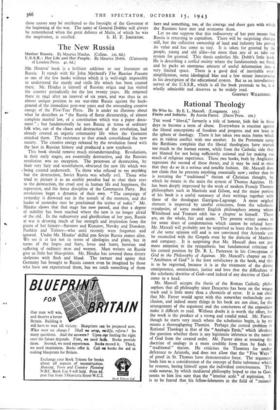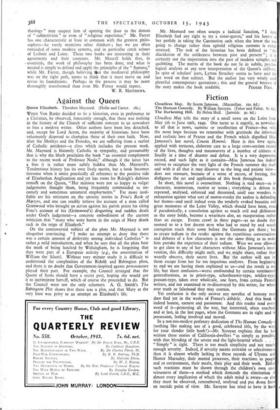Rational Theology
He Who Is. By E. L. Mascall. (Longmans. 155.)
Finite and Infinite. By Austin Farrer. (Dacre Press. 2os.)
THE word " liberal," formerly a title of honour, bids fair in these days to become a term of abuse. Everywhere is reaction against the liberal conceptions of freedom and progress and not least in the sphere of theology. There it has taken two main forms which are in violent conflict with one another. In the Protestant camp the Barthians complain that the liberal theologians have trusted too much to the human reason, while from the Catholic side they - are blamed for not being sufficiently rational and for making too much of religious experience. These .two books, both by Anglicans, represent the second of these theses, and it may be said at once that they do so in a serious and notable fashion. Mr. Mascall does not claim that he presents anything essentially new ; ,rather that he is restating the " traditional " theism of Christian thought, by which he means in the main the system of Thomas Aquinas. He has been deeply impressed by the work of modern French Thomist philosophers such as Maritain and Gilson, and the major portion of his book is a useful summary of their writings together with those of the theologian Garrigou-Lagrange. A more original element is imported by careful criticisms, from the scholastic standpoint, of some modem English philosophers among- whom Whitehead and Tennant eich has a chapter to himself. These are, on the whole, fair and acute. The present writer comes in for some share of condemnation which cannot be refuted here. Mr. Mascall will probably not be surprised to learn that he remains of the same opinion still and is not convinced that Aristotle can be reconciled with the Gospels even by the dialectic of Maritain and company. It is surprising' that Mr. Mascall does not pay more attention to the sympathetic but fundamental _criticism of his central position by Dr. R. L. Patterson in his Conception of God in the Philosophy of Aquinas. Mr. Mascall's chapter on the " Attributes of God " is the least satisfactory in the book, and this is to be regretted, because it is in the treatment of the divine omnipotence, omniscience, justice and love that the difficulties of the scholastic doctrine of God—and indeed of any doctrine of God— come to a head.
Mr. Mascall accepts the thesis of the Roman Catholic philo- sophers that all philosopty since Descartes has been on the wrong track and is little more than a chronicle of error. It is not clear that Mr. Farrer would agree with this somewhat melancholy con- clusion, and indeed many things in his book are not clear, for the arrangement of the argument and the conciseness of the exposition make it difficult to read. Without doubt it is worth the effort, for the work is the product of a strong and candid mind. Mr. Farrer, though he starts very much where the scholastics begin, is by no means a thoroughgoing Thomist. Perhaps the central problem in Rational Theology is that of the "Analogia Ends," which involves the question whether there is any legitimate inference to the nature of God from the created order. Mr. Farrer aims at restating the doctrine of analogy in a more credible form than he finds in " traditional " theism. He criticises the Thomists for undue
deference to Aristotle, and does not allow that the "Five Ways" of proof in St. Thomas have demonstrative force. The argument 'leads him to a consideration of the concept of finite substance which
he restores, basing himself upon the individual consciousness. The scala naturae, by which mediaeval philosophy hoped to rise to God, seems to him less sure than the " interior scale " of aspiration. It is to be feared that his fellow-labourers in the field of "rational
theology " may suspect him of opening the door to the demon of " subjectivism " or even of " religious experience." Mr. Farrer has one characteristic at least in common with the greatest philo- sophers—he rarely mentions other thinkers ; but we are often reminded of some modern systems, and in particular catch echoes of Leibniz and Lotze. These two books are interesting in their agreements and their contrasts. Mr. Mascall holds that, in essentials, the work of philosophy has been done, and what is needed is simply to defend and apply the principles of the " Summa," while Mr. Farrer, though believing *at the mediaeval philosophy was on the right path, seems to think that it must move on and revise its foundations. Perhaps in the process it may be more thoroughly transformed than even Mr. Farrer would expect.
W. R. MATTHEWS.



























 Previous page
Previous page